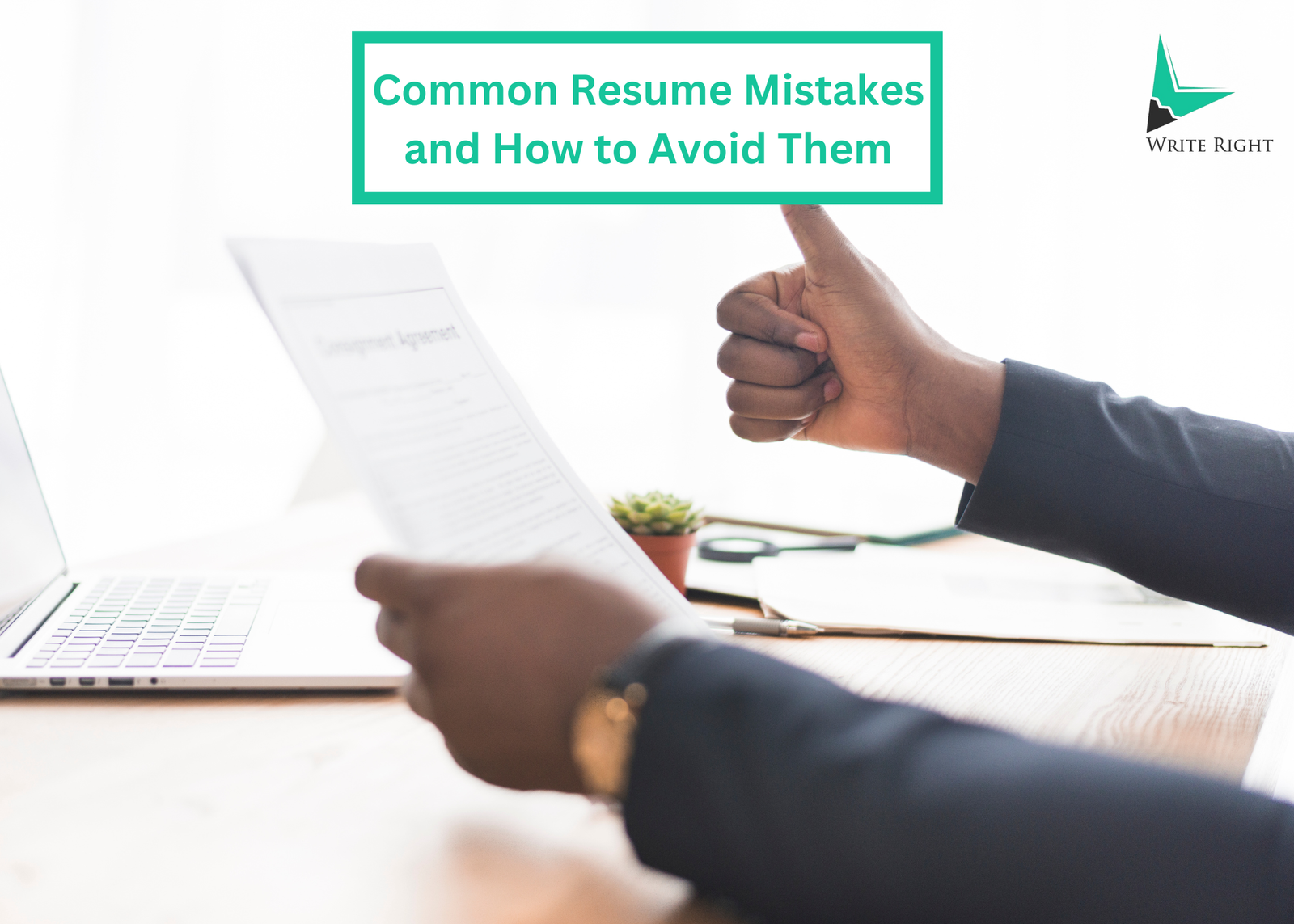Your resume provides an overview of your work experience, education, and abilities when applying for jobs, demonstrating to potential employers why you’d be a good fit for the role.
Thus it is important creating a compelling resume is essential for making a strong first impression on potential employers. However, many candidates make common mistakes that can hinder their chances of landing a job.
Utilizing professional CV writing services, resume writing services, and cover letter writing can also greatly enhance your chances of success.
This blog will highlight the top 10 common resume mistakes and provide detailed tips on how to avoid them.
1. Overlooking Spelling and Grammar Errors
One of the most common and easily avoidable mistakes on a resume is poor spelling and grammar. These errors can make a negative impression on hiring managers and suggest a lack of attention to detail.
How to Avoid:
- Proofread: Always proofread your resume multiple times. It can be helpful to read it out loud or ask a friend to review it. Double-check for common errors like “there” vs. “their” or “your” vs. “you’re.”
- Use Tools: Utilize tools like Grammarly or Hemingway to check for grammatical errors and improve readability.
- Professional Help: Consider using professional resume writing services to ensure your resume is polished and error-free.
Example: A CareerBuilder survey found that 58% of resumes contain typographical errors. Ensuring your resume is free from such mistakes can significantly enhance your chances of getting noticed.

2. Including Irrelevant Information
Many candidates include information that is not pertinent to the job they are applying for, which can distract from their relevant skills and experiences.
How to Avoid:
- Tailor Your Resume: Customize your resume for each job application. Focus on the skills and experiences that are most relevant to the job description.
- Objective Review: Ask yourself if each piece of information supports your candidacy for the specific role. If not, it may be best to omit it.
- Use Keywords: Incorporate keywords from the job listing to make your resume more relevant and to help it pass through ATS CV writing systems.
Example: If you are applying for a marketing position, highlighting your experience in social media campaigns and content creation is more relevant than detailing a past job as a cashier.
3. Lack of Quantifiable Achievements
Resumes that only list job duties without showcasing achievements can fail to impress employers. Quantifiable achievements provide concrete evidence of your skills and impact.
How to Avoid:
- Use Metrics: Include specific numbers, percentages, and metrics to quantify your accomplishments.
- Show Impact: Explain how your actions benefited the company, such as increasing sales, improving efficiency, or reducing costs.
- Be Specific: Rather than saying “improved sales,” specify “increased sales by 20% over six months through targeted marketing strategies.”
Example: According to Zippia, resumes with quantified accomplishments are 40% more effective than those without. Highlighting measurable results can make your resume stand out.
4. Using a Generic Resume Template
A generic resume template can make your application look like many others and fail to showcase your unique qualifications and personality.
How to Avoid:
- Customize Your Layout: Create a resume that reflects your personal brand while maintaining professionalism.
- Use Professional Templates: Opt for professional templates that can be customized to suit your style and the job you are applying for.
- Visual Appeal: Ensure your resume is visually appealing and easy to read, with clear headings and adequate white space.
Example: A study by TheLadders found that recruiters spend an average of 7.4 seconds initially scanning a resume. A unique, well-designed resume can more effectively capture their attention.
5. Failing to Highlight Skills
Many candidates list their job experiences but fail to emphasize their skills, which are crucial for matching job requirements.
How to Avoid:
- Skill Section: Include a dedicated skills section that highlights both hard and soft skills relevant to the job.
- Match Job Description: Tailor your skills section to match the job description, emphasizing the skills the employer is looking for.
- Certifications and Training: Include any relevant certifications or training that demonstrate your proficiency in the required skills.
Example: According to LinkedIn, 69% of hiring managers say that verified skills are more important than degrees in determining a candidate’s qualification. Emphasizing your skills can significantly boost your resume’s effectiveness.
6. Ignoring the Applicant Tracking System (ATS)
Many companies use ATS to filter resumes before they reach a human recruiter. Ignoring ATS optimization can result in your resume never being seen.
How to Avoid:
- Use Keywords: Incorporate keywords from the job description to help your resume pass through ATS filters.
- Simple Formatting: Avoid complex formatting, images, or charts that can confuse ATS.
- Standard Sections: Use standard headings like “Experience,” “Education,” and “Skills” to ensure ATS can easily parse your resume.
Example: Research by Jobscan indicates that 98% of Fortune 500 companies use an ATS. Ensuring your resume is ATS-friendly is critical for passing initial screenings.
7. Neglecting to Include a Cover Letter
While not always required, a well-written cover letter can provide context to your resume and highlight why you are a good fit for the position.
How to Avoid:
- Write a Tailored Cover Letter: Customize your cover letter for each job application, addressing specific requirements and explaining your interest in the role.
- Highlight Key Points: Use the cover letter to emphasize the most important aspects of your resume and how they relate to the job.
- Professional Tone: Maintain a professional tone and structure, avoiding overly casual language or excessive formality.
Example: A survey by ResumeLab found that 83% of hiring managers say a great cover letter can significantly improve a candidate’s chances of being hired. Writing a tailored cover letter can enhance your application.
8. Using an Unprofessional Email Address
An unprofessional email address can make a poor impression on employers and detract from your professionalism.
How to Avoid:
- Use a Professional Email: Create an email address that includes your name and appears professional. Avoid using nicknames, numbers, or informal language.
- Consistency: Use the same professional email address across all your job application materials, including your resume, cover letter, and LinkedIn profile.
Example: An email address like john.doe@gmail.com is much more professional than something like cooldude123@gmail.com. Maintaining professionalism in your contact information is essential.
9. Failing to Tailor Your Resume to the Job
Sending the same resume for every job application can significantly reduce your chances of success. Tailoring your resume shows that you are genuinely interested in the specific role.
How to Avoid:
- Customize for Each Job: Adjust your resume to highlight the skills and experiences most relevant to each job.
- Use Keywords: Incorporate keywords from the job description to align your resume with the employer’s needs.
- Highlight Relevant Experience: Emphasize experiences and achievements that directly relate to the job you are applying for.
Example: A report by TopResume found that tailored resumes receive a 45% higher response rate. Customizing your resume can significantly improve your chances of getting noticed.
10. Not Including Relevant Keywords
Failing to include relevant keywords can result in your resume being overlooked by both ATS and human recruiters.
How to Avoid:
- Analyze Job Descriptions: Identify and include keywords from job postings that match your skills and experiences.
- Use Action Verbs: Incorporate action verbs like “developed,” “managed,” and “implemented” to make your resume more dynamic and keyword-rich.
- Consistency: Ensure the keywords you use are consistent with those in the job description, enhancing the relevance of your resume.
Example: According to Glassdoor, resumes that include relevant keywords are more likely to be noticed by recruiters and ATS. Ensuring your resume is keyword-optimized can improve its visibility.
Benefits of Professional Resume Writing Services
Expertise in Industry Standards
Professional resume writers have a deep understanding of industry standards and what hiring managers are looking for. They can help you highlight your strengths and present your qualifications in the best light.
Example: A professional writer can transform a list of job duties into a compelling narrative that showcases your achievements and potential.
ATS Optimization
Resume writing services are skilled at optimizing resumes for ATS systems, ensuring that your resume passes the initial screening and reaches human recruiters.
Example: A professional writer can enhance your chances of passing ATS filters by incorporating relevant keywords and structuring your resume correctly.
Tailored Approach
Professional resume writers provide personalized services, tailoring your resume to fit your career goals and the specific requirements of the job you are applying for.
Example: A tailored resume can highlight your unique qualifications and experiences, making you stand out from other applicants.
Time and Stress Reduction
Creating an effective resume can be time-consuming and stressful. Professional services can take this burden off your shoulders, allowing you to focus on other aspects of your job search.
Example: Using a resume writing service can free up your time to prepare for interviews and network with potential employers
To avail Resume writing services, Contact Now.
FAQs
What Are Mistakes in a CV?
Common mistakes in a CV include spelling and grammar errors, using a generic format, including irrelevant information, and failing to quantify achievements. These errors can make a negative impression on potential employers and decrease your chances of getting an interview.
What Are the Don’ts of a Resume?
- Don’t Use Unprofessional Email Addresses: Always use a professional email address.
- Don’t Include Irrelevant Information: Tailor your resume to the job you are applying for.
- Don’t Lie or Exaggerate: Be honest about your skills and experiences.
- Don’t Forget to Proofread: Spelling and grammar mistakes can make a poor impression.
- Don’t Use Complex Formatting: Keep the format simple and ATS-friendly.
What Is an ATS Resume?
An ATS resume is designed to pass through an Applicant Tracking System (ATS) used by employers to filter and rank resumes. It involves using relevant keywords, simple formatting, and standard headings to ensure the resume is easily read by the system.
What Are the 3 C’s of Resume Writing?
The three C’s of resume writing are:
- Clarity: Ensuring your resume is easy to read and understand.
- Consistency: Maintaining a consistent format and style throughout the document.
- Conciseness: Keeping the resume brief and to the point, focusing on relevant information.
What Is Not Allowed on a Resume?
- Unprofessional Email Addresses: Use a professional email address.
- Irrelevant Information: Only include information that is relevant to the job you are applying for.
- Personal Details: Avoid including personal information like marital status, religious beliefs, or political affiliations.
- Negative Language: Keep the tone positive and professional.
What Are the Don’ts for a CV?
- Don’t Include Irrelevant Job Experience: Focus on relevant experiences.
- Don’t Use Overly Complex Language: Keep it simple and clear.
- Don’t Use Inconsistent Formatting: Maintain a consistent format.
- Don’t Include Personal Information: Avoid unnecessary personal details.
Which Type of Resume Is Best?
The best type of resume depends on your career situation:
- Chronological: Best for those with a steady work history.
- Functional: Suitable for those with gaps in employment or changing careers.
- Combination: Ideal for those with a diverse set of skills and experiences.
What Are the 3 Main Types of Resumes?
The three main types of resumes are:
- Chronological: Lists work experience in reverse chronological order.
- Functional: Focuses on skills and experiences rather than chronological work history.
- Combination: Blends the chronological and functional formats, highlighting both skills and work history.
How to Make a Good Resume?
- Tailor to the Job: Customize your resume for each job application.
- Use Keywords: Incorporate relevant keywords from the job description.
- Quantify Achievements: Use numbers to highlight your accomplishments.
- Professional Format: Use a clean, professional format that is easy to read.
- Proofread: Ensure there are no spelling or grammar errors.
How to Write a Perfect CV?
- Start with a Strong Summary: Begin with a compelling summary that highlights your key qualifications.
- Detailed Work Experience: Provide detailed descriptions of your previous roles and responsibilities.
- Highlight Skills: Include a section that highlights your relevant skills.
- Education and Certifications: List your educational background and any relevant certifications.
- Professional Formatting: Use a clean, professional format that is easy to read.
What Is the Most Successful Resume Format?
The most successful resume format is often the chronological format, especially for those with a consistent work history. It is widely recognized and appreciated by employers for its clarity and straightforward presentation of work experience.
What Is the Easiest Resume Format?
The easiest resume format is the functional format. It allows you to focus on your skills and achievements rather than a detailed work history, making it ideal for those with gaps in employment or those changing careers.







